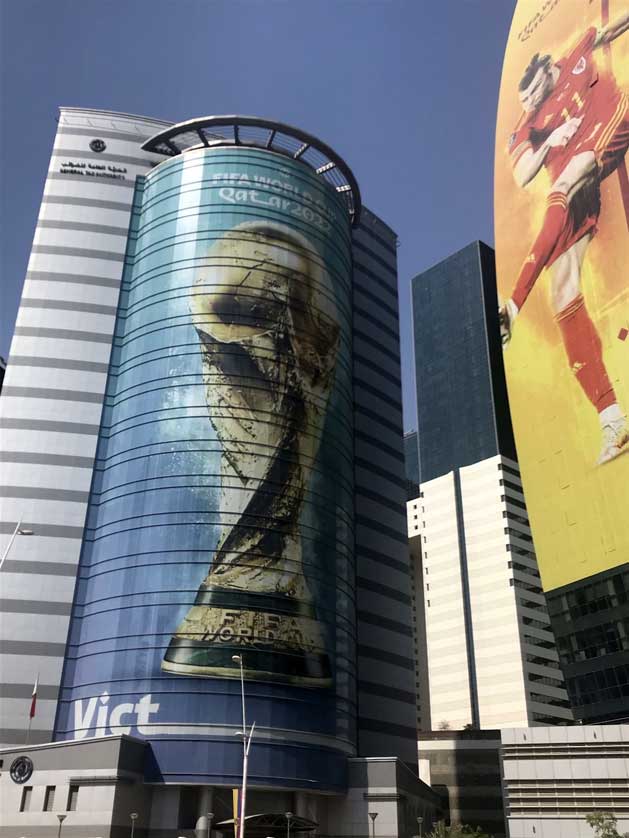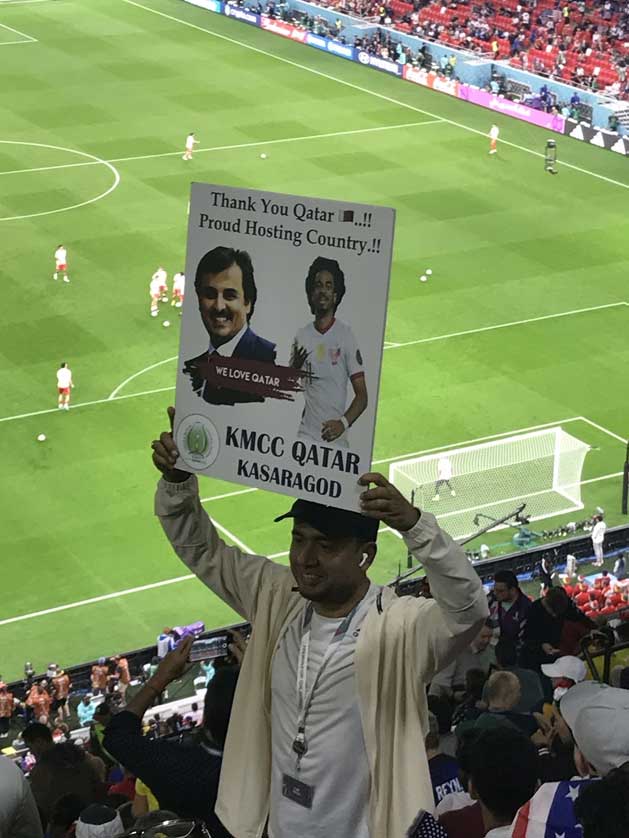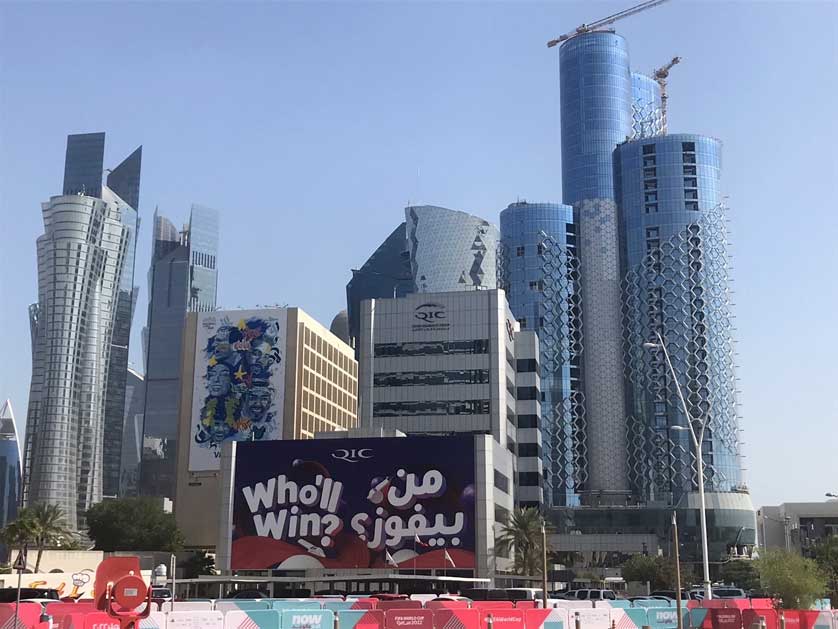THERE IS PLENTY WRONG ABOUT THE WORLD, NOT JUST QATAR
"Qatar is ready," proclaimed FIFA President Gianni Infantino on the eve of the World Cup.
No one can deny that. The 2022 organising committee has outspent all previous World Cup hostings combined in an effort to silence the many doubters.
Seven gleaming new stadia and a renovated one have risen from the desert.
They are amazing temples of modernity inside and out. 'Prepare to be Amazed' says the official website.
Equally impressive, the Doha metro will run to 3 a.m. throughout the tournament while express buses will whisk fans to the stadia without fuss. The teams' accommodation and training facilities appear first class.
"It will be the best World Cup ever," Infantino emphasised in his address.
On the pitch it may be such a feast of football it will go down in history. The past two World Cups saw so many goals and incidents that short memories believed they were witnessing the greatest yet in both years.
But off the field, Qatar 2022 has been anything but the best ever yet.
No World Cup hosting since Argentina in 1978 has attracted so much criticism for the host nation's human rights record and none before has so obviously been obtained through bribery and behind-closed-doors deals and handshakes.
In an infamous lunch at Paris' Elysee palace hosted by French President Nicolas Sarkozy shortly before the 2010 vote, the Emir and Prime Minister of Qatar and UEFA President Michel Platini agreed to throw Europe's votes decisively behind the Gulf State's bid.
With a G7 President on board, Qatar 2022 was put on the road to victory that afternoon and money duly flowed back to France to buy Paris Saint-Germain and French-built airliners and fighter planes - Riyals for Rafales.
Platini's defence for backing Qatar was that the Middle East had never hosted the tournament, which is in itself a valid argument, even if he was not telling the whole truth.
Former FIFA President Sepp Blatter, who supported the USA's bid for 2010, repeated his belief this week that Qatar was indeed the wrong choice, but only because it was too small! He confirmed human rights had meant nothing to the Executive Committee at the time.
Infantino, in his rambling hour-long soliloquy in Doha on Saturday, counter-attacked by claiming Europeans had exploited the world for "3,000 years" and should be addressing their crimes instead of slating Qatar for having a different culture.
Amnesty International retorted that it was a debate was about universal human rights, not culture wars.
Leaving aside Infantino's odd take on Europe in 1000 B.C., his memories of having being bullied for having red hair and freckles and his assertion that "I feel African, I feel gay, I feel disabled," etc, he raised an interesting point.
What does the word world mean in World Cup when countries maintain distinct cultures? Are globalisation and multiculturalism incompatible? Is FIFA wasting its time talking about its core ideals? Can we not just respect our differences, play football and leave the politics to the politicians?
Well no, we cannot, because global sport is too big now not to get involved with off-field matters. FIFA has been trying to 'Kick Racism out of Football' for years so why not homophobia, misogyny and the other deadly sins of the modern world? The World Cup is primarily but not uniquely about 22 men kicking a ball.
Sportswashing exists and FIFA is a prime enabler.
For 2022, the sport's world governing body did not even bother with its own technical report which had identified Qatar as "high-risk" regarding its summer temperatures, let alone any moral scruples.
But then the previous edition was in Russia, another pseudo-democracy with an autocratic leader who has subsequently confirmed the charge sheet leveled at him by invading a sovereign nation.
When Qatari football chief and AFC President Mohammed Bin-Hamman was banned for corruption in 2011, the extent of his bribery laid bare in 2014 and the staging of the finals changed from summer to winter in 2015, there was an overwhelming case for a re-vote on 2022, but good ole' FIFA kept its head in the sand.
Money talks ultimately, and Qatar carried too much geo-political weight as the world's leading supplier of liquified natural gas for this World Cup to be cancelled. Likewise, Russia's oil and gas exports and its pipeline to Germany protected its hosting in 2018.
Since then, Russia's invasion of Ukraine has made Europe more dependent than ever on Qatar to stay warm this winter and the 2022 World Cup more secure than before.
Visiting supporters will be struck by Qatar - its desert setting, its gleaming towers and conspicuous wealth, the co-existence of traditional Islam, high-end Western capitalism and the huge migrant population.
They will also note the lack of beer, at the last minute banned from the stadia, despite Budweiser being a major FIFA sponsor, which is rather funny. Like it or not, many football fans neck ale, a legacy of the sport's northern European origins perhaps, but this host has a different culture.
Qatar is only allowing alcohol (an Arab word ironically) to be sold in the fan zones or in hotels, at a hefty £12 a pint. Carrying or drinking it in public is illegal, which should be interesting.
Another note for the visitor will be the lack of visible women beyond some locals covered up in traditional Arab dress. Women are largely kept indoors in Qatar, unable to leave the home without male chaperoning or permission. But the world is a coat of many colours.
The knowledge that the World Cup stadia were built with a system of modern slavery, mostly exploiting migrant workers from the Indian subcontinent, leaves a bitter aftertaste, as do Qatar's frankly medieval attitudes towards LGBT people.
Perhaps the biggest culture shock will be the lack of street life, a result of the scorching temperatures which shifted the finals from summer to winter (a winter of around 30C) after the promises of air-conditioning vast arenas fell flat.
There will be no public fiestas to match those of France in 1998, Brazil in 2014 or the best of them all - Korea in 2002, an unforgettable experience for anyone who was out there.
Many fans have given Qatar 2022 a miss, put off by all of the above and the annoying scheduling in the run-up to Christmas. But even those of us watching on TV will be frustrated by trying to follow four games a day, which is a huge chunk out of anyone's life.
The weirdness of it all has left a number of us complaining the World Cup is getting in the way of an exciting domestic season, an extraordinary reaction given it is the sport's jewel in the crown and the world's most-followed event.
It will not destroy the tournament as a showpiece - 2026 will be a very big event in the former terra incognita of the United States and Canada, while China will sooner or later put on a World Cup every bit as spectacular as the 2008 Beijing Olympics.
But this moment in the World Cup's history is an anomaly, as if a well-known musician had opted to change the words and notes of a well-loved song, or if a bus driver had inexplicably taken a longer and more complicated route to the same destination.
But here we are, a legacy of Blatter's corrupt regime of the noughties, where contracts, favours and hostings were openly traded for bribes and kickbacks, most notably by Qatari football president Bin-Hamman and his partners in crime - Chuck Blazer, Julio Grondona, Nicolas Leoz, Ricardo Teixeira and Jack Warner.
Qatar 2022 in 2022 is just out of place and time. Since the vote in 2010 we have had Greta Thunberg, BLM, the energy crisis, and the Russian invasion of Ukraine.
A nation built on autocracy, patriarchy, a de facto caste system, modern slavery and fossil fuel consumption while even dallying with extremism is not the best representative of the world in 2022 as we in the West would like it to be.
But Qatar also has transformed itself into an expat paradise of Western brands, schools and employment. It supports the Muslim Brotherhood while hosting the largest U.S. military base in the Middle East, Al Udeid.
It has signed pacts of military cooperation with the US, UK, France and Turkey, been involved in the Libyan and Syrian civil wars, had an on-off relationship with the Saudis and acted as an international mediator in African conflict as well as facilitating meetings between the Americans and the Taliban.
In other words, it is a very internationally-connected country and therefore a fitting host of the World Cup.
So while Infantino was not wholly wrong, Qatar's choice of a global spotlight should not stop us in the West pointing out where we have improved and reasonably expect others to follow suit.
It is thus right to highlight the hypocrisy of Infantino's organisation promoting women's soccer so heavily while handing the World Cup to a nation where women are kept indoors. Ditto with LGBT inclusion. The West score higher on human rights than the Arab world yet depends on that same region for energy. We, the world, are the problem.
We might not warm to Qatari laws and customs but do we hate them enough to avoid the World Cup or turn off the central heating in January?
Been to London recently? The capital's tallest building is Qatari-owned, as is its august department store Harrods, the financial hub Canary Wharf, and the famous Claridge's, Ritz and Savoy hotels. Qatar is also the biggest shareholder in Barclays Bank and Sainsbury's supermarkets.
Then you could hop over to Paris, via Heathrow Airport (in which Qatar has the biggest stake) to see the world's biggest football star Lionel Messi play for Qatari-owned PSG. We are all to blame.
Qatar is 88% expat anyway, a global diaspora there to make a quick buck in the Wild West while turning a blind eye to its wrongdoings. It is fine to slate Qatari customs but we are their facilitators and intimately entwined.
In its rampant capitalism, this host nation is arguably more representative of the world we live in, warts and all, than any other. It is Amazon, McDonalds, Primark or Walmart.
But we need to reassess what we mean by 'World' Cup when there are varying cultures and laws which are not all mutually pleasing. If it means the world's best face then FIFA could start by having an ethical test based on the UN's Universal Declaration of Human Rights when assessing hosting.
The dossiers released by Human Rights Watch and Amnesty International on the eve of the tournament are sobering stuff, lists of shame FIFA blatantly ignored when selecting and standing by its choice of host.
Qatar 2022 remains wrong for so many reasons, "a parody of a parody" as Brian Glanville put it, a fraudulently obtained prize that should have been recalled once the facts were out in the open or when the promised summer scheduling was arbitrarily canceled.
But the football has begun and I am happy. I hope Qatar puts on a good show. I hope the host nation recovers from its dismal start. I hope the visitors enjoy the tournament, the country and its hospitality.
I hope the locals like the visitors too and that the cultural exchange leads everyone to understand each other at least a little more and entertain better ideas. As Rocky said in Russia having beaten Ivan Drago, "We can all change."
We should at least acknowledge the changes in Qatar's Kafala system which have come about because of the World Cup after we failed to make Russia more democratic after 2018. That is a start.
'We are about more than football,' Gareth Southgate said famously.
Indeed, and the World Cup is the world. And we all have to work together to make it better.
Qatar 2022
Qatar v Ecuador - Opening Match
© Soccerphile.com




